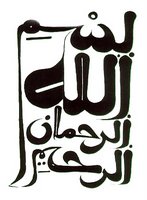The Quran and the Quraysh Quandary
 Before Islam, and before oil, the natural resource of the peninsula Arabs was Arabic, a language precise in grammatical structure yet sublime, nuanced, and subtle in yield. The early Arabs were a people who did not sculpt or paint masterpieces. Their homes were flat and plain, and their food uncomplicated and bland, and wine particulate, warm, but functional. But words: they meant the universe. They were honey and everything beautiful about living. The Arabs told their history through hundreds of stacked lines that were, in a way, their notion of an “afterlife,” with their memories vouchsafed in words long after the flesh hopelessly turns to dust, interred forever in such a state. Poetry, in particular, filled the vault of their lives, magnificent meter that drove even the ruffians to tears. Whenever the Arabs aimed their verses at one another, anyone of them would prefer a spear over words that recorded their infamies and then set them free in the ether of human culture.
Before Islam, and before oil, the natural resource of the peninsula Arabs was Arabic, a language precise in grammatical structure yet sublime, nuanced, and subtle in yield. The early Arabs were a people who did not sculpt or paint masterpieces. Their homes were flat and plain, and their food uncomplicated and bland, and wine particulate, warm, but functional. But words: they meant the universe. They were honey and everything beautiful about living. The Arabs told their history through hundreds of stacked lines that were, in a way, their notion of an “afterlife,” with their memories vouchsafed in words long after the flesh hopelessly turns to dust, interred forever in such a state. Poetry, in particular, filled the vault of their lives, magnificent meter that drove even the ruffians to tears. Whenever the Arabs aimed their verses at one another, anyone of them would prefer a spear over words that recorded their infamies and then set them free in the ether of human culture.For centuries, great minds of Islamic civilization have commented on God’s choice of Arabic and seventh-century Makkah as the form and context in which His final revelation would be brought to the temporal world. No scripture would come after it, as Muslims believe, nor prophet. When the Quran was revealed, it confronted and pierced the vanguard of the Arabs, their language, their strength. There was nothing indirect about it. It was sublime language composed up above coming down to a people whose sole science was language. It is not curious, then, that verses of the Quran in fact challenged the Arabs to produce anything like it.
Let's remember that of all the nuances of the human creature and its clear separation from the beasts of the earth, it is language that stands out, the ability to communicate through syntax and delicate discriminations of phonemes; through prose and poetry; through thousands of language systems that still cover the earth. We need not grunt or whistle or let out howls. We speak and produce the miracle of words by the slightest modifications of our tongues and breath: words that can elevate or offend, invite or warn, inspire or suppress, court or seduce, pray or curse, and so on.
The Quraysh understood the words that Muhammad recited. And they themselves marveled at these words and knew they were not ordinary. They were a people of language and to deny this would have been an admission of stupidity. The words chilled the back of their necks. They were dazzling and beautiful; but also terrifying—letters and syllables that crawled up their nerves telling the detractors things that they didn’t want to hear, things in the world, things beyond, and the fraud of idolatry. They had never heard anything like it, not even from their finest poets. They were words that shook the floor of their lives.
Well, this was the problem, the Quraysh quandry. Had Muhammad been a warrior waving a sword in his hand, the matter would have been easy. The Quraysh knew how to slay. Had he a history of treachery, debauchery, and violence—anything less than the supreme honesty he was known for—it would have been better for the opposition. But how do you battle an upright man, trustworthy in every way, by the Quraysh’s own estimation, armed only with words -- a language they loved and understood?
It is true, and must be, that the Quran helps its reader induce sense from the sense of beauty, but there’s something to say about deriving beauty from sense.
Unable to confront sense, the Quraysh had to do something else, and they did it. (Part two forthcoming, ia.)


3 Comments:
Truly beautiful :) And your lovely writing is a fountain of delight.
I look forward to the second part. May Allah guide your pen.
Ya Haqq!
Was this article published elsewhere? Just wondering due to the author's initials at the end.
The initials "ia" is, in my mind, "InshaAllah" or "God willing." This has not appeared anywhere but here.
Post a Comment
<< Home